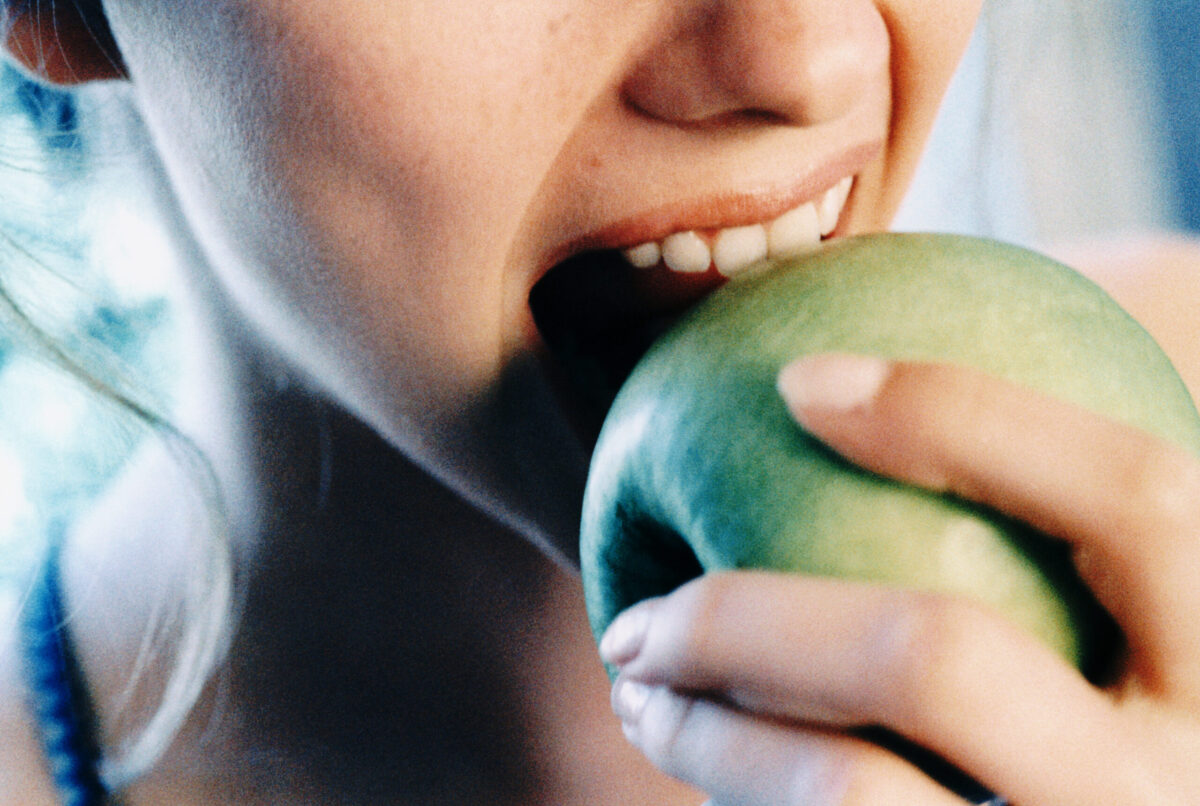You know these foods are good for you — but did you know that they’re especially good for your teeth?
According to dental experts, some foods not only help your body build healthy teeth, but they also help your mouth clear bacteria and acid while you’re eating them.
Here’s how it works, plus a few foods and drinks to boost your dental health.
How does food affect your teeth while you’re eating?
Chewing certain foods causes your mouth to produce saliva, which helps remove leftover food particles and clear acid and bacteria from teeth.
Fruits and vegetables are especially good at this, as well as any foods that are:
- Firm
- Coarse
- Watery AND
- Fibrous
What role does sugar play in dental health?
Bacteria converts sugar into acid that damages your teeth. The more often you eat sugary foods, the less effective your saliva is at neutralizing those acids. What’s more: sugary foods stick around in your mouth, and will continue to harm your teeth long after you’ve finished eating them.
Sugary beverages
The same is true of sugary drinks. Continuously sipping beverages like juice, soda, wine or sugary alcoholic drinks feeds the acid-producing bacteria in your mouth.
What role does fluoride play?
Fluoride is a naturally occurring mineral that’s crucial to preventing tooth decay and building strong bones and teeth. Its acid-resistant properties are why fluoride is added to toothpaste and drinking water, and why dental-health experts recommend eating foods that are naturally high in fluoride, such as seafood, carrots and beets.
7 things to eat, drink & chew for fresher breath and stronger teeth
1. Water
Water is the best beverage for oral health.
Fluoride helps make teeth resistant to cavity-causing acid. Since Tennessee follows the national water fluoridation recommendations, drinking tap water is an easy, free way to boost your oral health.
Drinking water throughout the day can also prevent dry mouth, a condition where bacteria thrives and causes cavities, gum disease or bad breath.
2. Tea
Unsweetened black and green teas help your mouth fight plaque, a sticky film of bacteria that frequently forms on teeth. Antioxidants in tea help reduce the accumulation of dental plaque as well as the acidity of your saliva, which means cleaner teeth and stronger tooth enamel.
3. Fruits and vegetables
Produce is good for your teeth for many reasons:
- Fruits are high in water and fiber, which counteracts any natural sugars they contain.
- Chewing fruits and vegetables stimulates saliva production, which washes away acid and food particles, naturally cleaning your teeth.
- Vegetables such as celery and fennel give your teeth an extra cleaning because their textures scrape leftover food and bacteria off your teeth as you eat them.
- Other vegetables, such as carrots and beets, naturally contain fluoride, as do canned tomatoes.
- Foods that are rich in vitamin C — red bell pepper, broccoli, snow peas — create a hostile environment for mouth bacteria.
Try these teeth-protecting types of produce:
- Apples
- Beets
- Bell peppers
- Broccoli
- Carrots
- Celery
- Grapes (and raisins)
- Fennel
- Leafy greens
- Potatoes
- Snow peas
- Spinach
4. Seeds and nuts
Nuts are low in carbohydrates, which, as sugars or starches, can activate acid-producing bacteria. Chewing nuts stimulates saliva production, which can help cut your risk for tooth decay. Pumpkin seeds and soybeans (edamame) are good sources of phosphorus, a mineral that’s key to the formation of bones and teeth.
5. Seafood
Most seafood is a good source of fluoride because oceans contain natural sodium fluoride. Crab and shrimp are especially high in the cavity-preventing mineral.
6. Yogurt
Eating sugar-free yogurt regularly may reduce bad breath by lowering the levels of odor-causing sulfide compounds. Look for yogurts that include probiotics (good bacteria) such as streptococci and lactobacilli bacteria.
7. Sugar-free gum
Chewing gum, especially after a meal, loosens food and removes dead cells from your teeth, gums and tongue. To improve breath, try sugar-free gum sweetened with xylitol, a sugar replacement that may inhibit the growth of mouth bacteria.
More from WellTuned on dental health
- Does dental health affect overall health?
- 6 common dental emergencies and how to handle them
- Childhood dental health guide
Get more information about specific health terms, topics and conditions to better manage your health on bcbst.com. BlueCross BlueShield of Tennessee members can access wellness-related discounts on fitness products, gym memberships, healthy eating and more through Blue365®. BCBST members can also find tools and resources to help improve health and well-being by logging into BlueAccess and going to the Managing Your Health tab.





